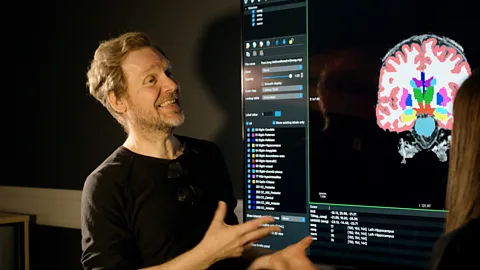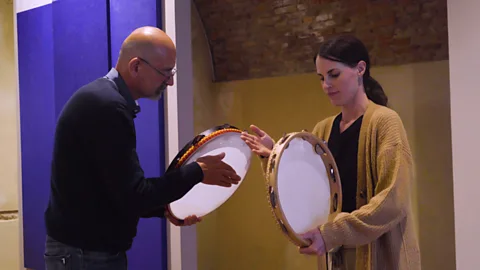How I rewired my brain in six weeks

There is growing evidence that simple, everyday changes to our lives can alter our brains and change how they work. Melissa Hogenboom put herself into a scanner to find out.
"It's surprisingly hard to think of nothing at all", is one of my first thoughts as I'm lying in the maw of a machine that is scanning my brain. I was told to focus on a black cross while the functional Magnetic Resonance Imagine (fMRI) machine does its noisy work. It also feels impossible to keep my eyes open. The hum of the scanner is somewhat hypnotic, and I worry a little bit that drifting off will affect how my brain appears on the resulting images.
As a science journalist I've always been fascinated by the workings of the mind, which is how I found myself inside a scanner at Royal Holloway, University of London, to have my brain examined before embarking on a six-week brain-altering course.
My goal was to investigate whether there's a way we can influence meaningful brain change ourselves. By altering aspects of my daily life, I hoped to find out if it is possible to strengthen crucial connections in our brain, and keep our mind healthier in the process. Along the way I learnt techniques we can all use – with some powerful results.
Our brain has an incredible ability to adapt, learn and grow because by its nature, it is plastic – that is, it changes. This is called neuroplasticity, which simply means the brain's ability to adapt and evolve over time in structure and function. It was once thought to be limited to youth but we now know it's a constant force in shaping who we are. Every time we learn a new skill, our brain adapts.
Neuroscientists and psychologists are now finding that we have the power to control that to some extent. And there's good reason to want to boost our brain – an increasing number of studies suggest it can play a role in delaying or preventing degenerative brain diseases.
So, with the help of Thorsten Barnhofer, a professor of clinical psychology at the University of Surrey in the UK, that's what I set out to do. He's currently running a study on the effects of mindfulness in managing stress and difficult emotions, with a special focus on individuals with severe depression.
I was surprised that something as simple as mindfulness can play such a crucial role in keeping our minds healthy. Research has shown that mindfulness is a simple but powerful way to enhance several cognitive functions. It can improve attention, relieve pain and reduce stress. Research has found that after only a few months of mindfulness training, certain depression and anxiety symptoms can ease – though as with any complex mental health problem, this may of course vary depending on individual circumstances.
There's more to it. Mindfulness can change the brain. That's because when the stress hormone cortisol increases and remains high, "it can become toxic for your brain", says Barnhofer. Stress can also directly inhibit neuroplasticity, so managing it allows the brain to remain more plastic.
The question is, would this work in my brain? Over six weeks, Barnhofer modified a mindfulness research course for me to try out. For 30 minutes a day, either as one single session or two 15-minute sessions, I practiced a guided mindfulness meditation by listening to a recording. In addition, I had one weekly meditation session with Barnhofer, who guided me over Zoom. The full mindfulness course can be accessed online for free.
My instructions were to be as aware as possible to the present moment – and pay attention to things I might usually ignore, such as where my thoughts go, and what occupies my mind from moment to moment. He also encouraged me to be more mindful in daily life – say when cooking or running, to really focus on the moment, bringing my mind back to what I was doing, as well as noticing how often it wanders.

What's fascinating about this area of research is that mindfulness, which appears to be such a simple process, can have a measurable effect. "What mindfulness does is it can buffer stress, you become aware of challenges and those more ruminative responses, a tendency to worry," explains Barnhofer.
While I'm perhaps not an ideal candidate – my stress levels, which were measured before and after the process, are generally low – I still felt a benefit. As soon as I started a session, it felt like the first minute or two were easy. I would focus on my breath, or parts of my body as instructed. But at any moment of silence I would find my mind going on time-travelling journeys. I'd think about a conversation with a friend from weeks ago, then flit within seconds to thinking about scheduling a dentist appointment, then next about an upcoming work deadline… and so on. In quick succession, I could see just how rapidly my mind shifted from thought to thought. Speed this up and it can become extremely exhausting.
"Mind wandering is something that of course might be helpful in many ways," says Barnhofer. "It might help us with creativity, but it's also something that can go awry. And this is where repetitive thinking comes in, where ruminative thinking comes in, where worry comes in. And those are the factors which increase stress once it's there."
When I started to notice this, it made more sense that this brilliant ability we all have to think ahead, to plan, to worry, can be debilitating if it goes into overdrive. In other words, revealing the workings of our own mind is a crucial first step of letting go of some of that busyness.
Throughout the six weeks I spent on this mindfulness course, I also spent time filming other neuroscientists for my Brain Hacks documentary to see if there were concurrent "hacks" I could implement. (You can watch Brain Hacks on BBC Select or BBC TV News.)

For instance, evidence shows that both meditation and exercise boost plasticity. I didn't increase my normal levels of exercise, but I did to push myself to run faster – regularly running a 5k in my hilly local park in about 21 minutes. Knowing that this might help boost my brain too, kept me motivated. "Physical activity facilitates the procedure of plasticity," says Ori Ossmy, a lecturer in brain and cognitive development at Birkbeck, University of London in the UK. "If you combine it with cognitive tasks to improve skills you are interested in, you probably will be able to do this in an enhanced way."
This makes sense given how closely the health of our bodies and our brains are tied together, agrees Gillian Forrester, professor of comparative cognition at the University of Sussex in the UK. "Our physical health and mental health are absolutely tangled up together to create a quality of life," she says.
Physical health is tied to cognitive health, too. It's by studying infants that scientists like Forrester are learning to see the brain/body link in action.
In Birkbeck University's brand-new Baby Lab, Forrester showed me her latest project called Baby Grow. The study will monitor babies' development in their first 18 months, with the aim of spotting signs of cognitive disorders before they become apparent. And the reason it's crucial to do it so early? It's tied to neuroplasticity too. A child's brain is especially plastic in its early years of development – new neurological connections and networks are being created at a frenetic pace as they grow and learn about their environment. This means it's potentially much easier to apply interventions for those who need it during this highly plastic state. This is one of the reasons why Forrester believes it is so important to learn more about everyday processes that help mould the brain.
The same idea also comes into play when patients are recovering from serious brain injuries. I met with Angelo Quartarone, the scientific director of the Centro Neurolesi Bonino Pulejo, a centre for brain injuries in Sicily. He witnesses plasticity in action every day. "Even in the worst conditions the brain helps to repair itself in some way… With neurorehabilitation we can accelerate recovery," he says. His team uses varied methods of assisting rehabilitation, including robotics, virtual reality, and placing electrical currents on the brain. "A tiny amount of currents can interact with the same mechanisms which are engaged by neurorehabilitation techniques," he says. "So you have a double hit."
I was amazed to learn that one of his patients, who had lost power in their right limbs, was able to forge new neural connections by playing simulated computer games. This helped them to regain lost motor skills.
This type of brain enhancement is something we can all learn from. It's clear that practicing new skills and regularly exposing ourselves to new situations all helps the brain to continue to adapt and grow. That's how I found myself ordering sundried tomatoes in Italian, getting a quick lesson on how to play a traditional Sicilian tambourine, before sitting at the base of Mount Etna and meditating. Of course, I have to add a huge caveat. I'm a sample size of one – and a lot of this was illustrative rather than scientific.

At the end of the six weeks, I was extremely curious to see if all this work had any effect on my brain. After another brain scan, and some trepidation about what might have happened inside my head in the intervening weeks, I visited Barnhofer at the University of Surrey to find out. He had been analysing and comparing my two brain scans long into the night.
There was a result: the structure of my brain had in fact changed. And there were a few measurable changes to be seen.
One half of my amygdala – an almond-shaped structure important for emotional processing – had reduced in volume on the right side. The change was minute but measurable. However, what's exciting is that this aligns with the scientific literature that shows mindfulness can reduce its size because it buffers stress seen in the amygdala. When we experience increased stress, the amygdala grows. I didn't feel particularly stressed to begin with, but even so, it was exciting to still see a change.
The other change was to my cingulate cortex, part of the limbic system that is involved in our behavioural and emotional responses. It is also important for the default mode network, a region that becomes active when the mind wanders and ruminates. In my brain, it had slightly increased in size over the six weeks, indicating increased control of that area. Again, this chimes with published studies in the scientific literature.
It also resonates with what I had noticed during my sessions. Over time I found I was able to keep my mind more restful – I was better able to zone out busy thoughts.
It was quite, if you will excuse the pun, mind-bending to see these results to my brain on a big screen in front of me. Just by being mindful, I had managed to increase a part of my brain that prevents my mind wandering too much.
A final note of caution – it is important to acknowledge that any brain changes we had seen could also be random. The brain is constantly changing anyway. But nevertheless, the studies suggest that the whole experience was a worthwhile challenge – and a process many people could easily benefit from.
Of course, for the changes to be long lasting, it's clear I should keep pushing myself to do some of these "hacks".
Am I going to continue meditate every day? I'd really love to say: "Yes of course." That is, if life doesn't get in the way…
Additional reporting by Tom Heyden and Pierangelo Pirak
- All content within this article is provided for general information only, and should not be treated as a substitute for the medical advice of health care professionals.
Source: BBC























































